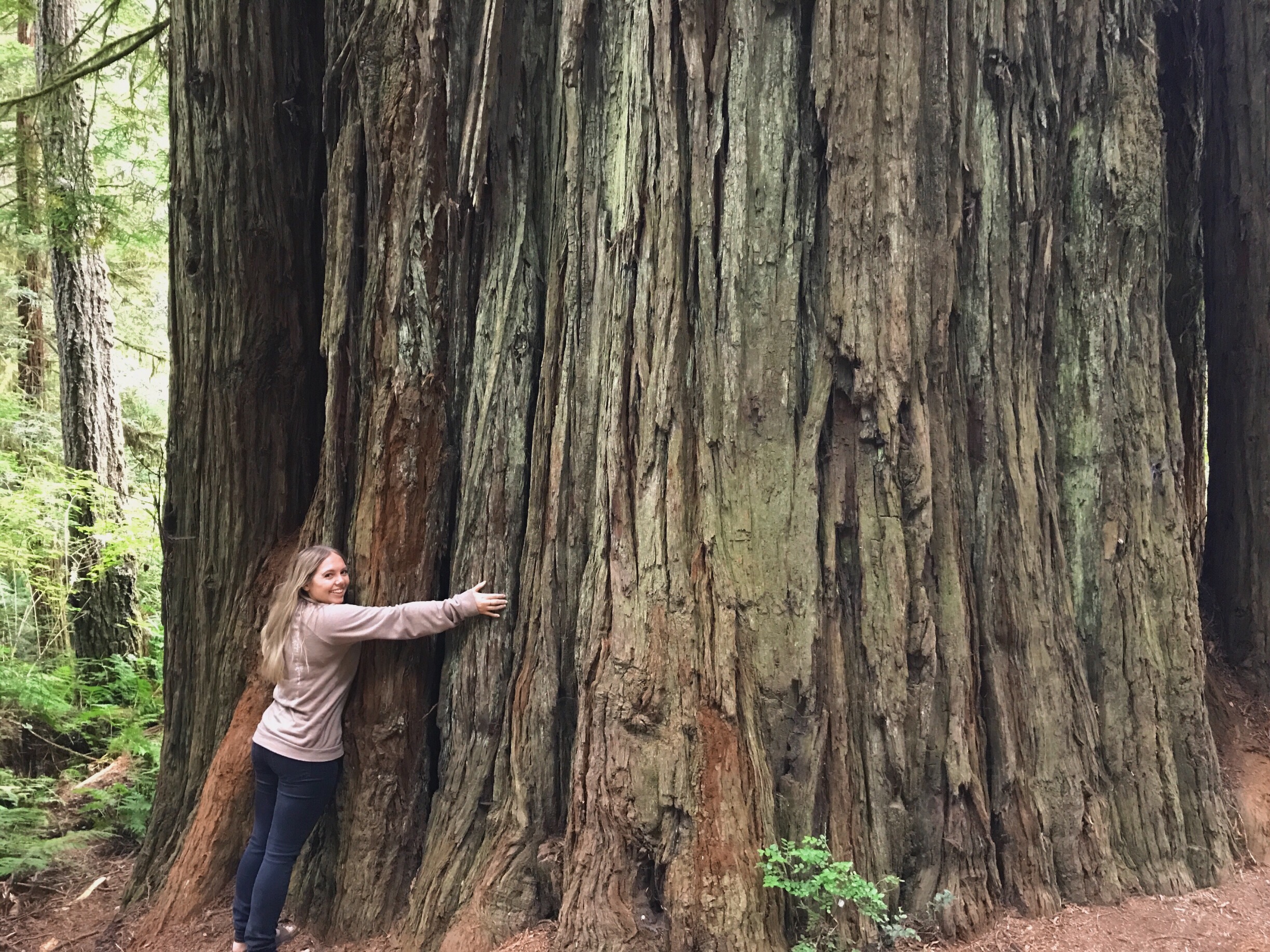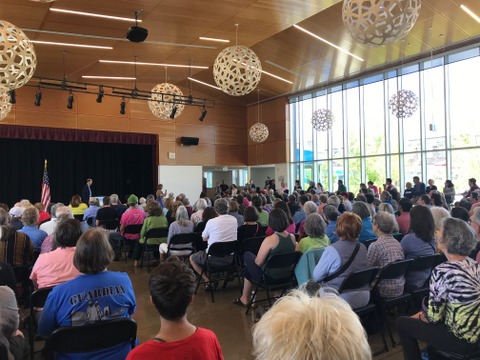
My name is Emma Land and I am the Community Outreach Intern at Oregon Wild’s Eugene office. This fall I will be starting my second year as a Master of Public Administration graduate student at the University of Oregon concentrating in environmental policy and sustainability. Last summer I moved from Kentucky to Oregon and decided to make it a month long road trip. I visited 14 states and countless state and national parks and recreation areas. I have been passionate about the environment for a long time, but the variety and beauty of the landscapes and wildlife I experienced over that trip were life changing. After school, I am excited to work in a field where I can work to advocate for environmental protections and preservation.
Some of my earliest memories are of playing in the creeks of Kentucky and taking walks through the woods with my grandmother. As a child growing up surrounded by breathtaking landscapes and a multitude of wildlife species, it was my grandmother who taught me to respect my place in the bigger picture and to be aware of my actions. It was her who taught me that while I did not own the land, water, and wildlife I experienced daily, I still had a responsibility to protect and preserve it. It was this mindset that pushed me to pursue an education focused on environmental policy and advocacy work. As I have gotten older, I have seen the growing reaches and powerful impacts that citizen engagement can truly have on issues that are important to a community. I believe individual citizens have great power in raising awareness and enacting change. While some may think that a single voice won’t make a difference, what happens when voices start talking to each other and realize they are no longer solitary but have become a crowd of individuals with shared passions and beliefs is remarkable. This is why it is vital for citizens to communicate and engage in advocacy work together because it creates a platform for important issues to be shared and voices to be heard.
Oregon Wild’s work to protect old growth forests and improve logging practices in the state are just a few of the reasons why I am excited for my internship. Towards the end of June I had the chance to meet with individuals from the Oregon Wild Ones program, a resource that helps community members find their voices through advocacy. The group met with Dan Whelan from Representative DeFazio’s office to talk about environmental issues that were important to them. We provided thanks for DeFazio’s support against the delisting of Oregon’s wolves from the threatened and endangered species list. We also talked about the current Farm Bill, and how it is vital for our leaders to fight against any environmental riders that would weaken our current environmental policies. We also encouraged Representative DeFazio to reintroduce the protection of the Wild Rogue and Devil’s Staircase this fall in celebration of the 50th anniversary of The National Wild and Scenic River Act. During the meeting, Mr. Whelan made a comment that resonated with the entire group. While Representative DeFazio may not always be able to support our efforts and we may not always agree with his positions, it is important to recognize and celebrate the areas where we do come together on important issues because this is where real change can happen. That point holds extreme value. Individual voices have the ability to come together to support issues that matter to communities. Having a dialogue and communicating concerns and passions are key to seeing real change occur.
The following week, Oregon Wild Ones had a meeting where we discussed town hall talking points and ways in which local citizens can talk to their representatives about important issues. Part of the meeting focused on how a citizen can most effectively get their message across to a representative in a limited time-frame. A simple recommendation was to introduce yourself and provide your zip code or the name of an organization you might represent. Doing so can provide context for your role as a constituent to your representative and the audience members. Additionally, It is important to think thoughtfully about what you want to say and how you want to ask a question. Prepare two to three questions in case one of your concerns is addressed before you have a chance to speak, and bring a written version of your testimony to help convey your message clearly and effectively.
 On July 2nd, 2018, Senator Ron Wyden held a town hall meeting at Roosevelt Middle School in Eugene. In perfect timing, the training points shared at the Wild Ones meeting were ready to be put to the test. Hundreds of citizens attended, and I saw several of the Wild Ones recommendations first hand from constituent testimonies. Almost every person who was called on to ask a question introduced themselves first, and a few even mentioned that they had previously spoken with the Senator. This information was valuable not only for Senator Wyden but for audience members as well because it showed the level of passion and commitment from their fellow community members. One woman stood up with several notecards in her hand. She stated that Senator Wyden had already acknowledged her initial concern about healthcare and then proceeded to flip to her next notecard and asked a question on a different issue. This was the very embodiment of the Wild Ones recommendations.
On July 2nd, 2018, Senator Ron Wyden held a town hall meeting at Roosevelt Middle School in Eugene. In perfect timing, the training points shared at the Wild Ones meeting were ready to be put to the test. Hundreds of citizens attended, and I saw several of the Wild Ones recommendations first hand from constituent testimonies. Almost every person who was called on to ask a question introduced themselves first, and a few even mentioned that they had previously spoken with the Senator. This information was valuable not only for Senator Wyden but for audience members as well because it showed the level of passion and commitment from their fellow community members. One woman stood up with several notecards in her hand. She stated that Senator Wyden had already acknowledged her initial concern about healthcare and then proceeded to flip to her next notecard and asked a question on a different issue. This was the very embodiment of the Wild Ones recommendations.
Another audience member touched on an issue that is important to me and the Oregon Wild community regarding the proposed LNG pipeline in Oregon. It was powerful to hear her concerns about the effects on clean air and the environment in this area. Senator Wyden’s response was also very powerful and encouraging. He first acknowledged that Oregon deserves to have a say in this process, and he plans to fight for that voice. Regarding the subject of environment as a whole, Senator Wyden believes that clean energy, clean transportation fuel, and energy efficiency are priorities, and he strongly disagrees with the actions of the former head of the EPA, Scott Pruitt. In his closing remarks on the subject, Senator Wyden stated, “On my watch, and we’ll see how this goes, I am not going to let anybody fudge on any of the environmental laws, eminent domain laws, or any of the principles that Oregonians feel strongly about.” These words hit home for me and my future in the environmental policy field. The environmental laws and policies of our country are vital if we hope to make positive impacts on our environment. We need individuals who are passionate about these issues to engage in policy work and advocacy in any way they can. During my time with Oregon Wild, I hope to reach individuals in my community and to encourage a dialogue about environmental issues and why they matter to us. If we can work together to advocate for the issues that matter most to us, we have a chance at seeing real change!

